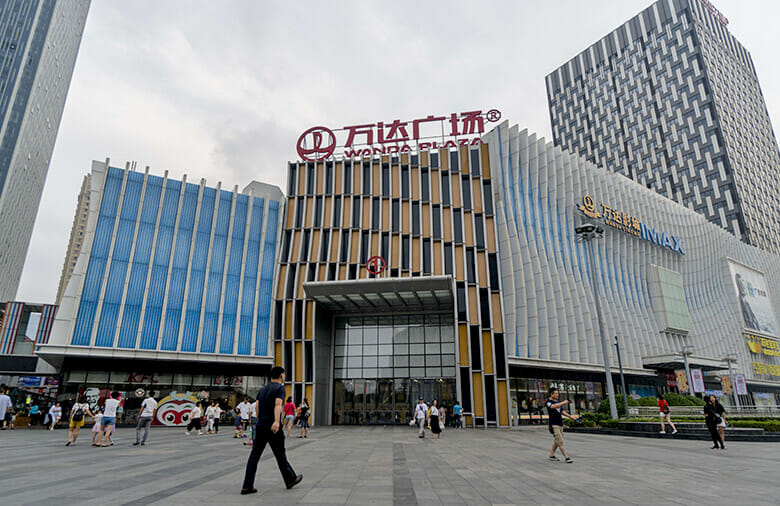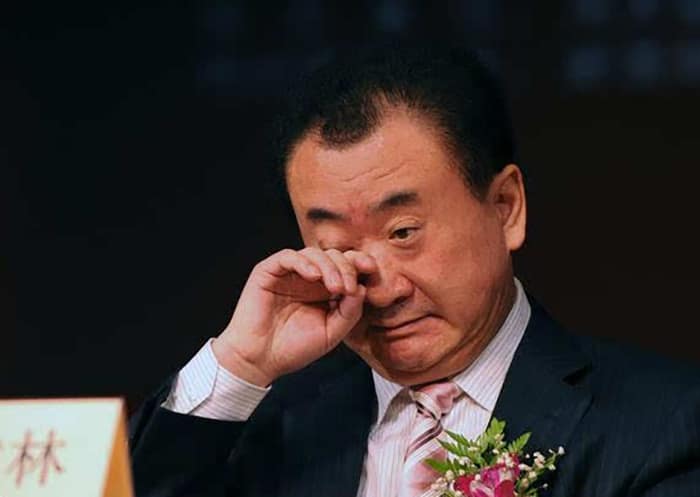
Dalian Wanda Group owns the Wanda Plaza in Shandong China (Getty Images)
Two of the three major credit ratings agencies have downgraded units of China’s Dalian Wanda Group after it asked holders of a $600 million bond to wait an extra year for repayment.
Fitch Ratings on Wednesday downgraded the key businesses holding and financing Wanda’s malls as the credit consulting firm sees bonds issued by China’s biggest commercial property developer sliding into distress. In a commentary explaining the downgrade, Fitch said it lowered its long-term foreign-currency issuer default ratings on two companies under the Beijing-based conglomerate by one notch to C — just one level above its lowest long-term ranking reserved for firms which have formally defaulted.
The downgrade, which Fitch sees reflecting heightened credit risk as the companies undergo what it terms a default-like process, comes after Wanda Properties, a unit of Wanda Commercial Management – which was one of the two entities downgraded – announced on Tuesday that it is seeking consent from bondholders to delay until 2025 payment of a $600 million offshore bond set to mature on 29 January 2024.
“Fitch considers the proposed amendments (to the offshore bond) as a distressed debt exchange as per its criteria,” the agency said in a release. “If the proposed consent solicitation is successful, the IDR (issuer default rating) will be downgraded to Restricted Default.”
In a separate rating action on Thursday, Moody’s Investors Service also downgraded its credit rating for Wanda Commercial Management and its corporate family to Caa2 from Caa1 citing the company’s request to noteholders for an extension on the offshore bond maturing in January.
Closing in on Default
Dalian Wanda Commercial Management (Wanda Commercial), one of the entities downgraded, is the primary holding company and operator for Wanda Group’s commercial and hospitality assets. Aside from asking creditors for a chance to delay its bond payments, Wanda Commercial is also pursuing waivers for both existing and potential events of defaults, according to Fitch’s release.

Wanda’s Wang Jianlin is struggling to avoid default
The other subsidiary downgraded is Wanda Commercial Properties (Hong Kong) Co. Limited (Wanda HK), which is Wanda Commercial’s wholly-owned overseas investment-holding company and its sole platform for offshore financing.
In the same release, Fitch also lowered its ratings on US dollar notes guaranteed by Wanda HK and issued by Wanda Commercial subsidiaries to C from CC. The agency also gave the notes a recovery rating of RR4, indicating that the instruments bear similarities to past securities that recovered only 31 percent to 50 percent of the current principal and related interest, according to Fitch’s criteria.
Fitch’s latest credit ratings revision for the Wanda units reverses an upgrade that both companies received in August. That positive change three months ago was attributed to Wanda’s repayment before the grace period expiration of a coupon on a $400 million bond set to mature in 2025.
Moody’s pointed to Wanda Commercial’s management as a factor in ratings downgrade.
“The companies’ governance risk exposure is reflected in DWCM’s concentrated ownership, complex organizational structure with low transparency and very weak financial management and management credibility, in view of its aggressive approach to managing (1) its liquidity to meet its maturing debt, and (2) its pre-IPO transaction,” the ratings agency said.
Wanda Group Turmoil
Wanda’s credit downgrades came after the company met a series of challenges this year, including making its fourth attempt to list its mall management unit on the Hong Kong stock exchange last June. That most recent filing came after Wanda had failed to gain approval from authorities for its three earlier attempts, with the June application still pending on the HKEX.
“The company’s liquidity will further weaken if its property management subsidiary is unable to launch its initial public offering (IPO) by the end of 2023, given the sizable amount of the repurchase obligation for the subsidiary’s pre-IPO capital,” Moody’s commented in its rating action.
The ratings agency noted that Wanda Commercial’s cash balance declined to RMB 13.3 billion by 30 September, from RMB 21.7 billion at the end of 2022 as it repaid some maturing debt using its internal resources. The developer had wealth management products worth around RMB 66 billion as of the end of September, Moody’s noted, while raising doubts about Wanda Commercial’s ability to use that cash in a timely manner for debt servicing.
Wanda has promised to repay pre-initial public offering backers if its shares were not listed by the end of the year. However, a week ago, the Chinese conglomerate was reported to have proposed delay repayment of its investors and giving them stakes in Zhuhai Wanda Commercial, a unit of Wanda Commercial holding a portfolio of the group’s properties, as collateral.
In July, Wanda agreed to sell off a 49 percent stake in a company holding a 20 percent slice of its Shenzhen-listed Wanda Film Holdings unit to streaming content operator China Ruyi Holdings for $320 million. The cash raised from that deal is said to have gone towards repaying its $400 million offshore bond that matured later that month.
In another July transaction, Wanda sold an 8.3 percent stake in Wanda Film Holdings for $306 million.
Last January, Wanda pledged its 65 percent stake in Wanda Hotel Development, representing its entire ownership in its Hong Kong-listed hospitality investment division, to Singapore’s Temasek Holdings as collateral for a loan.
The company’s management also went through its own difficulties as multiple members of Wanda’s team were detained by police in what was reported as a case of corruption. The August arrests included Liu Haibo, senior vice president of Wanda Commercial.
Wang Jianlin, chairman of Dalian Wanda Group, suffered the biggest drop in wealth this year among Chinese billionaires, according to the Hurun China Rich List 2023. After having been named China’s richest person in 2015 with a fortune estimated at $34.4 billion, the report said that Wang’s wealth had slid to $6.5 billion in October, down 53 percent from the previous year.
Chinese Builders Under Stress
Wanda’s downgrades come amid a wider credit crisis in mainland China’s property sector. More than half of the country’s former top 50 developers by sales in 2020 have gone into default, according to a report from the Financial Times.
Earlier this month, China Evergrande Group proposed a revised debt plan for restructuring $35 billion in offshore debt, offering to exchange existing notes for equity stakes of about 30 percent each in two of the developer’s Hong Kong-listed subsidiaries.
During this week, receivers working on behalf of a creditor seized two Hong Kong mansions held by entities linked to Evergrande and its chairman, Xu Jiayin, as the company struggles to pay off its estimated $340 billion debt.
Another property development company burdened with instability is Country Garden Holdings, which ranked as China’s largest builder by sales in 2022. In August the company failed to pay $22.5 million due on two sets of offshore bonds and is now said to be in discussions with the government regarding financial support.
Leave a Reply